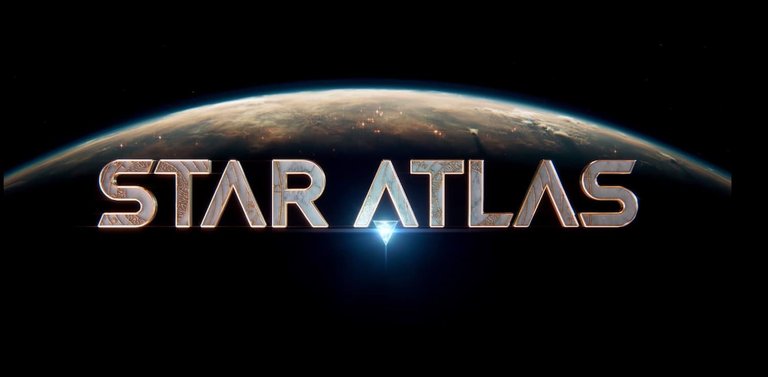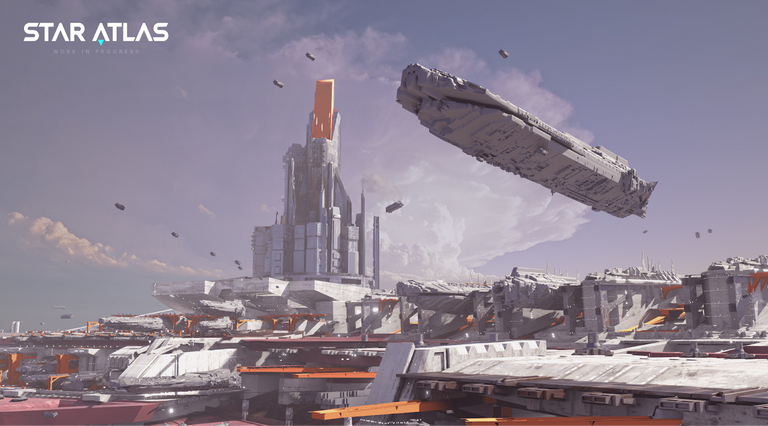Play&Earn 1/5
These are 5 promising projects from this group

Star Atlas
https://staratlas.com/
AAA level crypto game? What is this? What does this have to do with crypto?
On the Solana blockchain
What is Star Atlas really?
At first glance, Star Atlas is an MMO game that takes place in 2620. The universe has been colonized and balkanized. Three factions share control, and somewhere in the deepest, most dangerous sector of the cosmos, something extremely valuable is lurking.
So that players can earn in-game currency ($ ATLAS and $ POLIS), we can buy everything from ships to space stations, land and take part in missions.
What's the key difference that sets it apart from the rest: Star Atlas is based on blockchain technology - meaning players really own the things they win or buy in the game.
Building a metaverse economy
This entire system is built on two Star Atlas tiles. The first, $ ATLAS, is the typical in-game currency. Players can earn $ ATLAS by performing various activities such as mining ore and selling it on the in-game market, and even selling their assets. Almost everything in the Star Atlas, from spacecraft to land to mining platforms, is NFT. "There are very few items in the game that are not owned by the players," said Wagner.

And $ POLIS means you can play another aspect of the game - political intrigue. The Stellar Atlas has built-in management layers that are controlled by players, ranging from local corporations and guilds to giant regional DAOs. Each player with $ POLIS can make decisions about the game - and perhaps most interestingly, vote for the creators.
"When $ POLIS is distributed, we give up the majority package we have, and then it is entirely possible for the general public to make changes that we may not want," explained Wagner. "The point is, we won't have full control over the metaverse score in the future."
Wagner likes to describe traditional gaming revenue models as based on rent. "When you're a gamer, you buy access to the title and you can rent time in the game world," he says. “Things like your character, your character's outfit, your character's appearance, you have access to these items when you are in the game environment. But the moment you decide you don't want to play this game anymore, you lose all these items back to the game universe. "
In this case, Star Atlas "is like real home ownership." If a player ever decides to leave the Star Atlas universe, they can sell that resource - and hopefully make a profit.
Star Atlas is a game - and a public utility
This is what makes Star Atlas such an interesting project. It's not just an AAA level MMO game, but it's exciting in itself. The creators want to build a universe where players can really do what they want - and earn money on it. In other words, a real metaverse.
Wagner, who hails from the DeFi space, says the company is already taking steps to make people treat the game like a real economy, such as insurance (for very dangerous missions), borrowing (via the Jet protocol) and betting (which Wagner assures will be soon).
"I don't believe one technology company or entity should have control over the metaverse," he said. “Everyone should be able to contribute to this. It should be self-governing and the economy should be self-sufficient. "
Solana, feeding the metaverse
Solana is truly the only blockchain that has the power to make this ambitious project a reality. When the game was first created, Wagner said the team looked at a few different options, but Solana just made sense.
"First and foremost, we just needed scalable technology because we anticipate that at some point millions or even billions of users will be using metaverse," he said. "High transaction throughput, low transaction costs, finality of less than a second, which translates to low latency for our players when changing speeds, it all matters."
However, support from the Solana community - and the fact that Solana was backed by key institutional players - helped. The Solana Labs team, notes Wagner, was “very crucial to help us promote ourselves early on and get the initial user base tied to Solana's user base.
https://staratlas.com/
POLISH:

Star Atlas
https://staratlas.com/
Gra kryptograficzna na poziomie AAA? Co to jest? Co to ma wspólnego z krypto?
Na blockchainie Solana
Czym tak naprawdę jest Atlas Gwiezdny?
Na pierwszy rzut oka Star Atlas jest grą MMO, której odbywa się w 2620 roku. Wszechświat został skolonizowany i zbałkanizowany. Trzy frakcje dzielą kontrolę, a gdzieś w najgłębszym, najniebezpieczniejszym sektorze kosmosu czai się coś niezwykle cennego.
Dzięki czemu gracze mogą zarabiać walutę w grze ($ ATLAS i $ POLIS), możemy zakupić wszystko, zaczynając od statków po stacje kosmiczne, lądować i brać udział w misjach.
Jaka jest kluczowa różnica, która wyróżnia ją na tle innych: Star Atlas jest oparty na technologii blockchain – co oznacza, że gracze naprawdę posiadają rzeczy, które wygrywają lub kupują w grze.
Budowanie gospodarki metaverse
Cały ten system jest zbudowany na dwóch żetonach Atlasu Gwiezdnego. Pierwsza, $ ATLAS, to typowa waluta w grze. Gracze mogą zarabiać $ ATLAS, wykonując różne czynności, takie jak wydobywanie rudy i sprzedawanie jej na rynku w grze, a nawet sprzedając swoje aktywa. Prawie wszystko w Atlasie Gwiezdnym, od statków kosmicznych przez lądy po platformy wydobywcze, to NFT. „W grze jest bardzo niewiele przedmiotów, które nie są własnością graczy” – powiedział Wagner.
Z kolei $ POLIS oznacza, że możesz zagrać w inny aspekt gry - intrygi polityczne. Atlas gwiezdny ma wbudowane warstwy zarządzania, które są kontrolowane przez graczy, od lokalnych korporacji i gildii po gigantyczne regionalne DAO. Każdy gracz posiadający $POLIS może podejmować decyzje dotyczące gry – a co chyba najciekawsze, przegłosować twórców.
„Kiedy $ POLIS jest dystrybuowany, rezygnujemy z większościowego pakietu, który posiadamy, a następnie dla ogółu społeczeństwa jest całkowicie możliwe wprowadzenie zmian, których być może nie chcemy” – wyjaśnił Wagner. „Chodzi o to, że w przyszłości nie będziemy mieć pełnej kontroli nad wynikiem metaverse”.
Wagner lubi opisywać tradycyjne modele przychodów z gier jako oparte na czynszu. „Kiedy jesteś graczem, kupujesz dostęp do tytułu i możesz wynająć czas w świecie gry”, mówi. „Rzeczy takie jak postać, strój na twojej postaci, wygląd twojej postaci, masz dostęp do tych przedmiotów, gdy jesteś w środowisku gry. Ale w momencie, gdy zdecydujesz, że nie chcesz już grać w tę grę, tracisz wszystkie te przedmioty z powrotem do wszechświata gry. "
W tym przypadku Star Atlas „jest jak prawdziwa własność domu”. Jeśli gracz kiedykolwiek zdecyduje się opuścić uniwersum Star Atlas, może sprzedać ten zasób – i miejmy nadzieję, że zarobi.
Atlas gwiazd to gra - i użyteczność publiczna
I to właśnie sprawia, że Star Atlas jest tak ciekawym projektem. To nie tylko gra MMO na poziomie AAA, choć to samo w sobie jest ekscytujące. Twórcy chcą zbudować uniwersum, w którym gracze naprawdę mogą robić, co chcą – i zarabiać na tym pieniądze. Innymi słowy, prawdziwy metawers.
Wagner, który pochodzi z przestrzeni DeFi, mówi, że firma już podejmuje kroki, aby ludzie traktowali grę jak prawdziwą ekonomię, takie jak ubezpieczenie (na bardzo niebezpieczne misje), pożyczanie (za pośrednictwem protokołu Jet) i obstawianie (co, zapewnia Wagner , będzie wkrótce).
„Nie wierzę, że jedna firma technologiczna lub podmiot powinien mieć kontrolę nad metaverse” – powiedział. „Każdy powinien móc się do tego przyczynić. Powinna być samorządna, a gospodarka powinna być samowystarczalna. "
Solana, zasilająca metaverse
Solana jest naprawdę jedynym blockchainem, który ma moc, aby ten ambitny projekt mógł się urzeczywistnić. Podczas pierwszego tworzenia gry Wagner powiedział, że zespół przyjrzał się kilku różnym opcjom, ale Solana po prostu miała sens.
„Przede wszystkim potrzebowaliśmy tylko skalowalnej technologii, ponieważ przewidujemy, że w pewnym momencie z metaverse będą korzystać miliony, a nawet miliardy użytkowników” – powiedział. „Wysoka przepustowość transakcji, niskie koszty transakcji, ostateczność poniżej sekundy, co przekłada się na niskie opóźnienia dla naszych graczy przy zmianach prędkości, wszystko to jest ważne”.
Jednak wsparcie ze strony społeczności Solany – i fakt, że Solana była wspierana przez kluczowych graczy instytucjonalnych – pomogło. Zespół Solana Labs, zauważa Wagner, był „bardzo kluczowy, aby pomóc nam promować się na początku i uzyskać początkową bazę użytkowników powiązaną z bazą użytkowników Solana.
https://staratlas.com/
Congratulations @dragokazo! You have completed the following achievement on the Hive blockchain and have been rewarded with new badge(s) :
Your next target is to reach 2500 upvotes.
You can view your badges on your board and compare yourself to others in the Ranking
If you no longer want to receive notifications, reply to this comment with the word
STOPCheck out the last post from @hivebuzz:
Support the HiveBuzz project. Vote for our proposal!
Yay! 🤗
Your content has been boosted with Ecency Points, by @dragokazo.
Use Ecency daily to boost your growth on platform!
Support Ecency
Vote for Proposal
Delegate HP and earn more